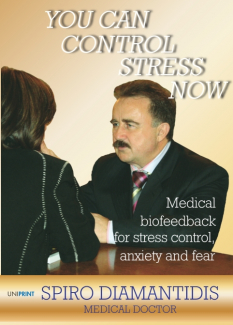WORK RELATED STRESS
Convictions about work
Modern societies have invested job with degrading notions which characterize the dupes, since the conviction that “slaves and clocks only work” gains steadily ground and is consolidated especially among youngsters.
Such convictions are tremendously harmful and can prove devastating for the human organism, given that negative attitude toward job stretching to the point of abhorrence or aversion, transforms workplace into multi-stressful environment in which the immune system as well the rest functions of the employee’s organism remain invariably under suppression.
On the opposite, it is natural to experience through your profession happiness and the full spectrum of positive emotions, emanating from seeing your work thrive and from the positive expression of your creativity.
Workplace stress as a social phenomenon
Today in industrially developed countries job stress takes the lead in the list of medical problems.
Northwestern National Life Insurance Company conducted an statistical survey which conveyed that 40% of USA workforce employees view their work as “very or tremendously stressful”.
One quarter of employees deem their work as the most stressing factor in their life.
Government sources in Great Britain estimate that forty million working days are lost annually, due to health problems solely accountable to job stress.
Giving a descriptive definition we could characterize job stress as the corruptive or malign somatic and psychoemotional response the working individual presents when its relation with its work becomes a stressor or when the individual’s expectations from its job do not match its abilities, resourcefulness and needs, which are dictated, always, by the subjective judgment of the person.
Stress at workplace triggers a line of reactions in the organism which «fires the alarm» and responds by regulating its various psychosomatic parameters in preparation for fight or flight. The nervous system is brought in a state of over-arousal. Adrenaline and other hormones are secreted to render senses more acute, pulse speeds up, respiration accelerates and muscles contract gradually accumulating tension.
The first symptoms of chronic job stress
“Why am I being tired all the time?”
“Why does my memory fail me?”
“Why my sexual performance is not any more as it used to be?”
“Why have I lost my interests?”
“What has come over me and I am so miserable and introvert?”
These are some questions commonly met in stressed, modern working people of industrial societies. Statistics are relentless. The impressive 80% of all visits made to doctors in primary health care services are accountable to symptoms or diseases originating in stress.
If attention and solutions are not provided to these problems, stress implications expand and entrench in deeper levels, causing more serious problems such as: cardiovascular disorders with paroxysmal high blood pressure, ischemic cardiac disease, heart stroke, brain stroke, diseases of the muscle-skeletal system, and melancholy which may lead to depression, suicide and cancer, chronic not healing ulcers and the spectrum of health problems issuing from chronic, stress related, immune system repression.
The most ordinary and primary ailments, indicating the existence of job stress are the following:
Difficulty in thinking.
Slow association of ideas.
Memory lapses for recent events.
Inability for relaxation and equanimity.
Increased and uncontrolled irritability.
Oversensitivity to noises and strong light.
Atypical migrating chest pains.
High blood pressure.
Bulimia or anorexic disposition.
Diffuse feeling of malaise in stomach and abdomen.
Insomnia.
Paroxysmal tachycardia or arrhythmia.
Superficial, irregular and unstable respiration.
Tension headaches, muscular tension mainly in shoulders, neck and lower back area.
Frequent, recurrent colds and various infections.
Elongation of healing time required for abrasion or
small wounds.
The adepts in business administration firmly believe that in the 21st century competitive and profitable will be the businesses having hold of the best and largest share of mental capital. Unfortunately, however, job stress destroys mental capital.
Are we sinking? Αre we aware of it?
In the USA are annually lost 500 billion dollars on account of work stress related situations, such as absence from work, accidents, personnel replacement and insurance costs, American Statistical Association 2003.
40% of staff replacements in companies are accountable to job stress. The purchase of services, programs and products to address workplace stress soared from 9.4 billion USA$ in 1995 to 11.31 in 1999. Outstanding place among these occupy biofeedback services.
Professions presenting high scores of work stress
Profession Score
Miners 8.3
Policemen 7.7
Prisons wardens 7.5
Construction workers 7.5
Pilots 7.5
Journalists 7.5
Directors of advertisement dprt. 7.3
Business executives 7.3
Dentists 7.3
Actors 7.2
Personnel managers 7.1
Department managers 7.0
Doctors 6.8
Radio-TV channels personnel 6.8
Nurses 6.5
Movie studio personell 6.5
Ambulance personell 6.3
Musicians 6.3
Firemen 6.3
Teachers 6.2
Social workers 6.1
Biofeedback is regarded as one of the chief ways to address job stress given that via the biofeedback process the working individual:
• recognizes the hazards created by job stress
and avoids it
• adopts a more homeostatic attitude in relation to
his workplace
• realizes and identifies his abilities
• comprehends the possibility to perform efficiently in
the specific job and the ensuing personal benefits
• changes his attitude towards work
consequently:
personally benefits from avoiding job stress
improves the relationship with the employers
gains respect in his workplace and his views are heard
gains prestige and enhances his social image
Ultimately, via biofeedback, desensitizes from work stress and safely handles it.
Large contemporary corporations adopt biofeedback in order to address job stress and in succession reward their employees with a portion of the ensuing profits. This way everybody is content and gains. Especially the workers are multiply benefited, from upgrading their living standards, from fortifying their health through biofeedback, and from the additional income which actively contributes in further reduction of job stress.






